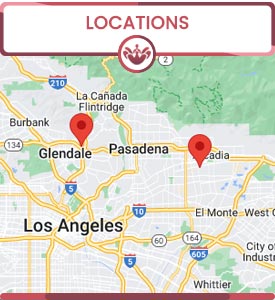Period or Pregnancy: Understanding the Signs
When you’re unsure whether it’s a late period or early signs of pregnancy, it can be confusing. Both conditions may involve symptoms like fatigue, bloating, and mood swings, but pregnancy often includes additional signs like nausea, breast tenderness, and heightened sensitivity to smells. At The OB-Gyn & Incontinence Center, Dr. Prema Kothandaraman provides comprehensive care to help you understand these symptoms and determine if pregnancy is the cause. For more information, contact us today or book an appointment online. We have convenient locations to serve you in Arcadia and Glendale, CA.


Table of Contents:
What are the common early signs of pregnancy compared to a period?
How can I tell if my symptoms are from pregnancy or my period?
Can implantation bleeding be confused with a period?
How does the timing of symptoms help distinguish pregnancy from a period?
What unusual signs may need medical attention when distinguishing period vs pregnancy?
The early signs of pregnancy and a period can be quite similar, but there are key differences that can help distinguish the two.
Common signs of pregnancy include missed periods, fatigue, nausea (morning sickness), and frequent urination. Women may also experience heightened breast tenderness, changes in taste and smell, and mood swings. Pregnancy symptoms often start to appear around the time of a missed period, but they can vary greatly from woman to woman. Many women also notice increased sensitivity in their breasts, more pronounced than usual premenstrual tenderness.
Signs of a period typically include cramping, bloating, and mood swings. Periods often bring a heavier flow of blood, which can last anywhere from 3 to 7 days. Some women also experience breast tenderness, but it usually resolves as the period progresses. Period symptoms can also be accompanied by headaches and back pain.
While both pregnancy and period symptoms can overlap (like fatigue and mood swings), the absence of bleeding and the presence of other pregnancy-related symptoms like nausea and breast sensitivity tend to indicate pregnancy. If you are unsure whether you’re pregnant or simply experiencing a late period, it’s always best to take a pregnancy test or consult with a healthcare provider for a clear diagnosis.
Determining whether your symptoms are related to pregnancy, menstruation, or other gynecological conditions can be confusing due to overlapping symptoms. At The OB-Gyn & Incontinence Center, we understand these concerns and offer expert guidance to help you distinguish between them.
● Cramping is common in both menstruation and pregnancy. Menstrual cramps are usually sharp and intense, occurring just before or at the start of your period. In early pregnancy, cramps are typically milder, described as a dull ache, with sensations of pressure or stretching in the lower abdomen.
● Breast tenderness is also frequent in both conditions. For menstruation, it appears just before your period and fades afterward. In pregnancy, it tends to persist and intensify and may include changes such as darkening or enlarging areolas.
● Fatigue occurs in both cases, but pregnancy-related fatigue is often more severe and lasts longer than the expected period. Persistent fatigue could also signal hormonal imbalances or other gynecological issues.
● Spotting or mild bleeding can indicate pregnancy or other conditions. Implantation bleeding is lighter, shorter, and often appears as pink or brown spotting, compared to the heavier flow of a period. Spotting may also result from hormonal fluctuations, infections, or uterine issues.
● Nausea and vomiting are more typical of pregnancy, especially morning sickness, which involves sensitivity to smells, queasiness, and vomiting. Menstruation may cause digestive discomfort, but not to the same extent.
● Mood swings are common in both, but pregnancy-related mood changes are typically more intense and longer-lasting.
To clarify your symptoms, taking a pregnancy test is often the first step. If there’s still uncertainty or persistent symptoms, a consultation at The OB-Gyn & Incontinence Center can help with a thorough evaluation and treatment options for pregnancy concerns or other gynecological conditions.
At The OB-Gyn & Incontinence Center, our specialists understand that differentiating between implantation bleeding and menstrual bleeding can sometimes be challenging for our patients. Implantation bleeding occurs when a fertilized egg attaches itself to the uterine lining, typically between six and twelve days after conception. This can result in spotting or mild bleeding, often lighter and shorter in duration than a regular menstrual period, which can lead to confusion due to overlapping timing.
Unlike a typical menstrual period, implantation bleeding is generally lighter in flow and tends to appear pinkish or brownish rather than bright red. It also typically lasts from only a few hours to a couple of days, whereas menstrual bleeding commonly persists for several days with a heavier flow. Additionally, menstrual symptoms such as cramping, bloating, and mood swings are usually more pronounced during a regular period, whereas implantation bleeding often occurs with minimal or no discomfort.
If you experience unusual spotting or bleeding and suspect pregnancy or have questions about your menstrual health, our experienced OB-Gyn team is here to help. We encourage you to schedule an appointment for personalized evaluation, clarification, and comprehensive guidance tailored to your specific health needs.
At The OB-Gyn & Incontinence Center, we understand that differentiating between early pregnancy symptoms and menstrual symptoms can be challenging. Recognizing these differences helps you better understand your body and know when to seek medical guidance.
Menstrual symptoms like bloating, cramping, mood swings, fatigue, and breast tenderness typically appear one to two weeks before menstruation and resolve after bleeding begins. In contrast, early pregnancy symptoms usually start around the expected time of your period and may persist or intensify over the following weeks. For example, implantation bleeding, a common early pregnancy sign, occurs 6–12 days after fertilization and is lighter, shorter, and less intense than regular menstruation. Nausea and morning sickness usually start around the fourth to sixth week of pregnancy and gradually increase.
Breast tenderness differs as well—premenstrual tenderness fades after menstruation begins, while pregnancy-related tenderness tends to persist and increase during the first trimester. Fatigue related to menstruation typically fades once your period starts, whereas pregnancy fatigue often persists or worsens.
Our experienced team helps you interpret your symptoms, offers reliable pregnancy testing, and provides personalized care for your unique health needs. Scheduling a consultation ensures clarity, peace of mind, and the right care.
At The OB-Gyn & Incontinence Center, we emphasize recognizing unusual symptoms that require medical attention when distinguishing between period symptoms and early pregnancy. Sharp or persistent abdominal pain, especially on one side, could signal an ectopic pregnancy, which requires immediate evaluation. Heavy bleeding with dizziness, faintness, or fatigue may indicate complications such as miscarriage.
Other pregnancy-related care concerns include significant nausea and vomiting (hyperemesis gravidarum), which disrupts daily activities, and severe headaches, vision changes, or swelling in the hands and face, which could point to preeclampsia. Unusual discharge with strong odors, abnormal coloration, or irritation may indicate infections. Additionally, emotional changes such as severe anxiety, depression, or extreme mood swings should be evaluated by our compassionate specialists. Prompt medical consultation with our experienced team ensures appropriate care for any concerning symptoms.
At The OB-Gyn & Incontinence Center, we encourage you to pay close attention to your body’s signals. Promptly consulting our expert medical professionals when experiencing unusual or concerning symptoms ensures you receive appropriate, personalized, and timely care for your overall reproductive health and well-being. For more information, contact us today or book an appointment online. We have convenient locations to serve you in Arcadia and Glendale, CA. We serve patients from Arcadia CA, Glendale CA, Monrovia CA, Pasadena CA, Los Angeles CA, Burbank CA, and surrounding areas.


Additional Services You May Need
▸ Urogynecology
▸ Minimally Invasive Gynecology
▸ Monalisa & Medical Aesthetics
▸ Bioidentical Hormone Replacement Therapy
▸ Urinary Incontinence
▸ Pelvic Organ Prolapse
▸ Painful Bladder
▸ Urinary Tract Infection
▸ Genitourinary Syndrome of Menopause
▸ Female Sexual Dysfunction
▸ Urinary Retention
▸ Vaginal Laxity & Prolapse
▸ Postpartum Pelvic Floor Problems
▸ PCOD
▸ Bladder Prolapse Repair
▸ Urgent PC
▸ Fibroids
▸ Excessive Bleeding
▸ Pelvic Pain
▸ Birth Control & IUD
▸ Vaginal & Pelvic Infection
▸ Monalisa Touch
▸ STD
▸ TempsureVitalia
▸ Biote Pellet Therapy
▸ Topical BHRT
▸ Flexsure
▸ Rectal Prolapse Repair
▸ Tempsure ENVI
▸ Minimally Invasive Pelvic Surgery for Incontinence



